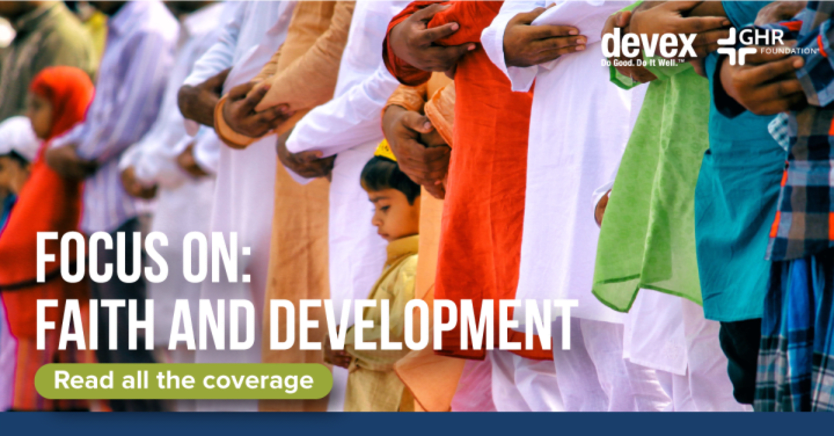
For a recent proposal to serve Venezuelans on the move, Natasha Freidus needed to identify a partner with strong relationships across Latin America.
Part of our Focus on: Faith and Development
This series illuminates the role faith actors and their communities play in strengthening global development outcomes.
Freidus serves as the co-founder and CEO of NeedsList, which develops software that matches relief organizations with resources. Its model works best when its tools are in the hands of people who have trusted relationships with the communities they serve, Freidus said.
Freidus approached the Scalabrini International Migration Network, an umbrella organization of Catholic missions on migration, to pitch a partnership that would involve priests and other front-line workers gathering a sense of community needs, uploading those requests on an online marketplace developed by NeedsList, and documenting donations when they arrive.
“They were an appealing partner for us because they do have boots on the ground and trust and are in pretty much every country in Latin America, so that gave us immediate options to scale,” Freidus said. “Anybody who’s working in technology, who’s looking to scale their tech solutions, is going to want to operate through networks. Religion is pretty much the biggest network out there.”
NeedsList is one of a growing number of social enterprises turning to faith-based organizations in an effort to scale their technology. Religious groups have been key to grassroots organizing in low-resource settings, Freidus noted, largely because of the “tremendous power they have to tap into trusted networks.” For tech-enabled international development solutions, partnerships with faith-based organizations can help fast track the path to adoption.
“Anybody who’s working in technology, who’s looking to scale their tech solutions, is going to want to operate through networks. Religion is pretty much the biggest network out.”
— Natasha Freidus, co-founder and CEO, NeedsListPeek Vision, a social enterprise that develops smartphone technology for low resource eye health services, was seeking a pathway to scale in low- and middle-income countries. It, too, found a valuable partner in a faith-based organization.
“Too often, technology projects don’t take off because they lack local expertise needed to make them a success,” Andrew Bastawrous, co-founder and CEO of Peek Vision, said in an email to Devex.
Peek Vision is partnering with CBM, an international development organization focused on improving the quality of life for people with disabilities, to roll out its smartphone-based solution, which tracks a patient’s journey from screening to treatment.
“Based on its Christian values and expertise, CBM has a proactive, partnership-based approach to improving the lives of people with disabilities in low- and middle-income countries,” Bastawrous said. “That partnership-based approach is very much in line with our own values, which is one reason why we’ve been able to successfully work together.”
The COVID-19 pandemic is likely to lead to more partnerships between tech and faith-based groups, bringing physical interactions to digital platforms, said Shahin Ashraf, head of global advocacy at Islamic Relief.
Q&A: Islamic Relief CEO on faith-based fundraising during COVID-19
While many organizations have seen their income and fundraising suffer due to the COVID-19 pandemic, Islamic Relief Worldwide has seen a surge in faith-based giving.
Religious organizations have access to sex- and age-disaggregated data that will be essential in developing many of these technology solutions, as well as trust from communities that might not otherwise be comfortable sharing their data, she explained.
Faith also provides social capital, allowing religious organizations to build relationships with the people they serve, whether or not they are of the same faith, Ashraf added. With access to places where communities gather, faith-based groups can then promote tech solutions, demonstrating not only how they work, but also how they can improve quality of life.
“Religious organizations and leaders can be helpful in credentialing the use of tech solutions and the organizations backing them, much like religious groups have done with promoting acceptance of vaccines over time,” J. Mark Brinkmoeller, former director of the Center for Faith-Based and Community Initiatives at the U.S. Agency for International Development, said in an email to Devex.
At their best, religious organizations can work to ensure that the success of any given technology is measured by how it improves people’s lives, in a move away from tech for the sake of tech, he added.
Faith-based organizations are well-placed to create an environment where donors, local leaders, and partners can work together to help the most vulnerable people, said Karl Lowe, chief information officer and vice president at Catholic Relief Services.
“Through the local Catholic Church networks, CRS has a very strong, trusted partner who understands the local context and who helps us to better design and deliver technology that best meets the needs of our participants,” he said.
Universities, social enterprises, and tech companies that want to ensure their technology reaches the most marginalized populations should consider partnering with religious groups, according to Peter Macharia, senior director of operations at World Concern, a Christian global relief organization headquartered in Seattle, Washington.
“Faith-based organizations penetrate the most remote parts of the world, reaching people that are usually the last to access aid via technology,” Macharia said in an email.
Still, by and large, the international development community overlooks the value faith-based organizations can bring to technology-driven solutions, said Charlie Goldsmith, who launched an organization with a mission grounded in faith in 2011 that was acquired by Corus International in 2019.
“Across Africa, faith-based organizations are really key to service delivery," he said in an email. “Some Global North actors are not familiar with faith, and that unfamiliarity can seem to drive them to shy away: they can end up spending more money to set up parallel, less legitimate institutions, that can be vulnerable to abuse.”
Organizations with long-standing ties in communities are in the best position to build trust, whether they are religious or not, said Suzanne Rexing, executive adviser to the CEO of Action Against Hunger-USA, and a former staffer at CRS.
“I believe that faith-based organizations are not unique in their ability to secure trust, and in fact recent history has eroded years of longstanding trust in some religious communities,” she said.
Whether or not an organization is religious, it must ensure that new technologies bring real value to the communities it serves, in order to earn and maintain their trust, Rexing added.
While Freidus of NeedsList sees the value in partnering with faith-based organizations, she said she has also been “wary of the possibility” that relief efforts could be “tied to missionary activity.”
The project she is pursuing in Latin America involves the Scalabrini International Migration Network, as well as a health NGO and an LGBTQ advocacy organization, which she described as “unlikely partners.”
For organizations looking to scale technology for development, “faith-based networks aren’t the only way, but they should certainly be one of the ways,” Freidus said.
Devex, with support from our partner GHR Foundation, is exploring the intersection between faith and development. Visit the Focus on: Faith and Development page for more. Disclaimer: The views in this article do not necessarily represent the views of GHR Foundation.









